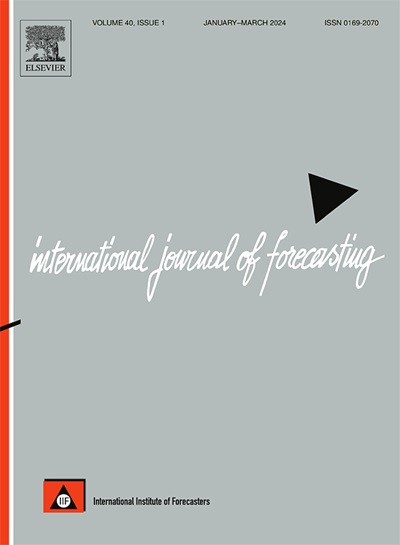Factors affecting preferences between judgmental and algorithmic forecasts: Feedback, guidance and labeling effects
IF 7.1
2区 经济学
Q1 ECONOMICS
引用次数: 0
Abstract
Previous research has shown that people prefer algorithmic to judgmental forecasts in the absence of outcome feedback but judgmental to algorithmic forecasts when feedback is provided. However, all this work has used cue-based forecasting tasks. The opposite pattern of results has been reported for time series forecasting tasks. This reversal could have arisen because cue-based forecasting studies have used preference paradigms whereas the time series forecasting studies have employed advice-taking paradigms. In a first experiment, we show that when a preference paradigm is used in time series forecasting, the difference in the conclusions about the effects of feedback in the two types of forecasting disappears. In a second experiment, we show that provision of guidance showing accuracy of algorithmic and judgmental forecasts can eliminate effects of feedback. Two further experiments reveal how choices between algorithmic and judgmental forecasts are influenced by the way in which those forecasts are labeled.
影响判断预测和算法预测之间偏好的因素:反馈、指导和标签效应
先前的研究表明,在没有结果反馈的情况下,人们更喜欢算法预测而不是判断性预测,而在有反馈的情况下,人们更喜欢判断性预测。然而,所有这些工作都使用了基于线索的预测任务。对于时间序列预测任务,报告了相反的结果模式。之所以会出现这种逆转,是因为基于线索的预测研究使用了偏好范式,而时间序列预测研究使用了建议采纳范式。在第一个实验中,我们表明,当在时间序列预测中使用偏好范式时,两种预测类型中反馈效应的结论差异消失了。在第二个实验中,我们证明了提供显示算法和判断预测准确性的指导可以消除反馈的影响。两个进一步的实验揭示了在算法预测和判断预测之间的选择是如何受到这些预测的标签方式的影响的。
本文章由计算机程序翻译,如有差异,请以英文原文为准。
求助全文
约1分钟内获得全文
求助全文
来源期刊

International Journal of Forecasting
Multiple-
CiteScore
17.10
自引率
11.40%
发文量
189
审稿时长
77 days
期刊介绍:
The International Journal of Forecasting is a leading journal in its field that publishes high quality refereed papers. It aims to bridge the gap between theory and practice, making forecasting useful and relevant for decision and policy makers. The journal places strong emphasis on empirical studies, evaluation activities, implementation research, and improving the practice of forecasting. It welcomes various points of view and encourages debate to find solutions to field-related problems. The journal is the official publication of the International Institute of Forecasters (IIF) and is indexed in Sociological Abstracts, Journal of Economic Literature, Statistical Theory and Method Abstracts, INSPEC, Current Contents, UMI Data Courier, RePEc, Academic Journal Guide, CIS, IAOR, and Social Sciences Citation Index.
 求助内容:
求助内容: 应助结果提醒方式:
应助结果提醒方式:


